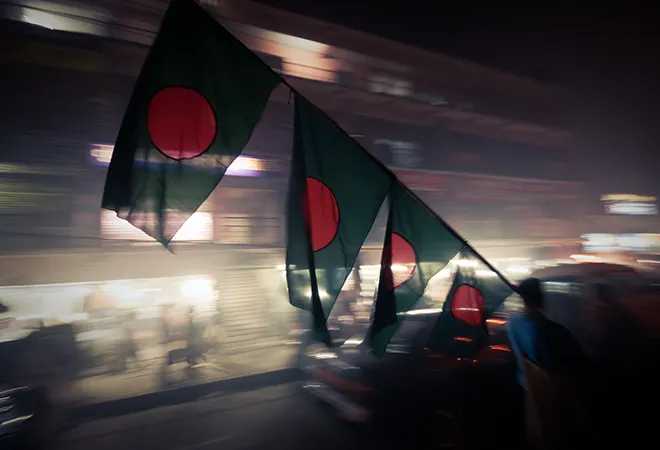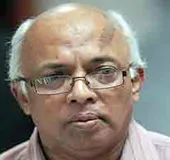-
CENTRES
Progammes & Centres
Location
The absence of a strong, credible opposition in Bangladesh’s new parliament will limit the scope for some much-needed debate.

Image Source: Aninda Kabir Avik/Getty
There is little question that the Awami League is thrilled about being returned to its third consecutive term in office — altogether four terms if one includes the period between 1996 and 2001. For the first time since 1973, when under Sheikh Mujibur Rahman, the founder of the country, the party won almost every seat at the general elections in March that year, the Awami League has never had it so good. One could even go back to the first general election held in Pakistan in December 1970, when of the 169 seats earmarked for what was then East Pakistan, the Awami League garnered 167, enough to give it a clear majority in the 313-seat proposed national assembly of Pakistan. The results of the 1970 election were, however, nullified through the genocide launched by the Yahya Khan military regime, the ramifications of the action leading to the birth of Bangladesh a year later.
It appears that Sheikh Hasina has now opted for a cabinet comprising new and certainly younger elements noted not only for their loyalty to the prime minister, but also for the fact that they are a pointer to the Awami League’s emphasis on the growth of new leadership.
The Awami League’s triumph in the December last year has of course been questioned by its rivals. That has not prevented Prime Minister Sheikh Hasina from starting off with a clean new slate, beginning with a by and large new council of ministers. A large number of ministers in the old cabinet have been dropped, to the shock of many who expected to continue in office. It appears that Sheikh Hasina has now opted for a cabinet comprising new and certainly younger elements noted not only for their loyalty to the prime minister but also for the fact that they are a pointer to the Awami League’s emphasis on the growth of new leadership. To what extent the new ministers and ministers of state will prove capable of meeting the expectations of the party remains to be seen.
On a separate issue, the ruling party is in quite a bit of a conundrum given that its huge majority has now led to a situation where not much of an opposition has made its way into the Jatiyo Sangsad, Bangladesh’s parliament. Of the 300 seats in the House (fifty extra seats are reserved for women), the AL and its allies in the Grand Alliance have won 288 seats. Of that figure, the AL on its own obtained 257 seats. For its part, the Jatiyo Party of General Hussein Muhammad Ershad, the former military ruler, went home with 22 seats. The JP was in the last parliament in the curious position of acting both as the official opposition in the legislature and being part of the government, with some of its senior leaders serving as ministers in Sheikh Hasina’s cabinet. As for the Bangladesh Nationalist Party of jailed former prime minister Khaleda Zia, it was left with a pitiful five seats at the election. Its leadership of course rejected the results, terming the election a managed affair by the government and the Election Commission. The BNP, part of the Gano Oikya Front, the national unity front led by the respected lawyer and former foreign minister Kamal Hossain, has refused to have its five MPs-elect take the oath of office. Dr. Kamal Hossain’s Gano Forum, which too was part of the GOF, ended up coming by a mere two seats. Despite initial hints that for all his disappointment with the outcome of the vote, Hossain would have his lawmakers-elect be sworn in, the two newly elected lawmakers in the end stayed away from entering parliament officially.
The ruling party is in quite a bit of a conundrum given that its huge majority has now led to a situation where not much of an opposition has made its way into the Jatiyo Sangsad, Bangladesh’s parliament.
That is part of the problem, a very parliamentary one, which the ruling party is today up against. Ershad, not in the best of health these days, has agreed that his 22 MPs will play the role of the opposition in the parliament, he taking on himself the mantle of leader of the opposition. That, for the government, is certainly a gracious move on the general’s part. But what worries citizens is whether, if at all, the Jatiyo Party will be able to perform as the kind of forceful opposition which the BNP would have. The JP has never quite been taken seriously by political observers owing primarily to its lack of popular appeal and its inability to fashion credible political programmes in parliament or outside. Both the BNP and JP were founded by military rulers, the first by General Ziaur Rahman in the late 1970s and the second by General Ershad in the 1980s. But where the BNP was able to make a dent in public impressions as a party, becoming a strong rival to the Awami League especially under Zia’s widow Khaleda Zia, the JP quite clearly was unable to achieve a similar feat.
To what extent, therefore, the JP will now be able to perform as the parliamentary opposition is a good question mark. That takes one to the matter of the partners of the Awami League in the Grand Alliance, three of whose leading lights served as ministers in Sheikh Hasina’s last government. All these ministers have now been dropped, with the new cabinet comprising solely Awami League lawmakers. The Workers Party of Rashed Khan Menon, the Jatiyo Party faction led by Anwar Hossain Manju and the Jatiyo Samajtantrik Dal faction headed by Hasanul Haq Inu have declined to entertain any notions of going into opposition on the ground that as partners of the AL, they went to the electorate with the boat symbol of the Awami League. That places them in a predicament: they have not been accommodated in government and they are reluctant to be in opposition. Besides, it will be rather inexplicable if, being part of the AL-led Grand Alliance, they are expected by the ruling party to move to the opposition benches, unless of course the AL formally puts an end to the alliance. That too will raise questions, for these non-AL lawmakers were elected as part of a team headed by the AL. If they are ditched by the Awami League or if they volunteer to move out of the Grand Alliance, what constitutional position will they enjoy in parliament? General Ershad has of course asked the lawmakers elected from these parties to join his 22 MPs in the opposition, a suggestion to which they have not as yet responded.
The absence of a strong, credible opposition in Bangladesh’s new parliament will of course limit the scope for some much-needed debate on the myriad issues plaguing the country. And to what extent ruling party lawmakers themselves will be in a position to generate convincing and profound discussions in the House on these issues is not, at this stage, easy to imagine.
The coming days will be interesting to watch. Parliament has been called into session at the end of January.
The views expressed above belong to the author(s). ORF research and analyses now available on Telegram! Click here to access our curated content — blogs, longforms and interviews.

Syed Badrul Ahsan is a Senior Journalist and Commentator on South Asian affairs based in Dhaka. Ahsans entry into full time journalism came about through ...
Read More +